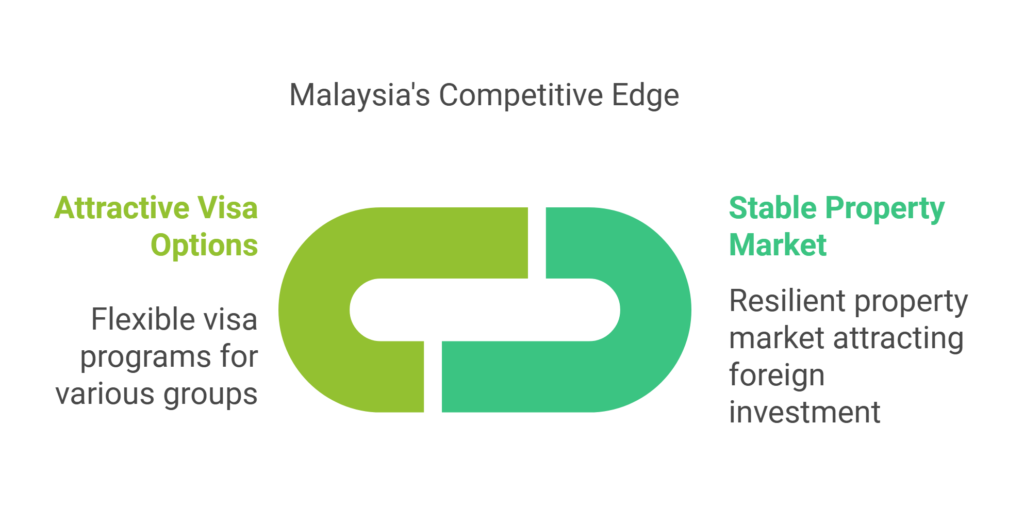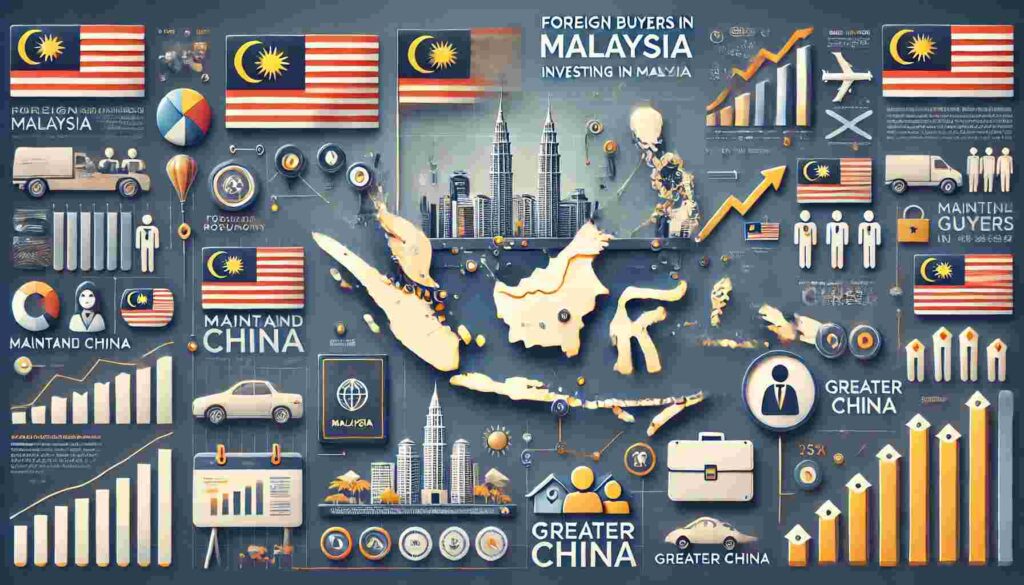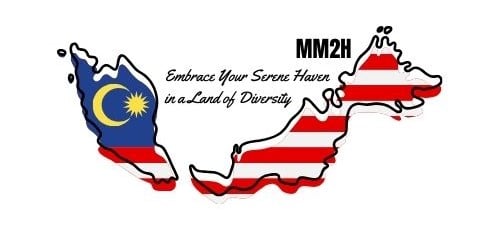Malaysia Leads ASEAN in Property Market and Economic Growth
Malaysia is solidifying its position as the leader in Southeast Asia’s property market. By leveraging its strategic strengths, Malaysia continues to attract foreign investments and establish itself as a key player in the ASEAN region. According to insights from Juwai IQI, a global property firm, visa holders under programmes like Malaysia My Second Home (MM2H) and the Premium Visa Programme have significantly boosted Malaysia’s economy. These developments place Malaysia on track to lead ASEAN property trends and maintain its regional and global influence into 2025.
Why Malaysia Leads ASEAN in Property Market
Malaysia’s property market is thriving, supported by a stable economy and forward-looking policies. The government, under Prime Minister Datuk Seri Anwar Ibrahim, has prioritized sustainable growth, making the country an attractive destination for foreign investments. This success is also tied to Malaysia’s commitment to fostering strong partnerships within the ASEAN region.
The property market benefits from programmes like MM2H, which cater to wealthy retirees, digital nomads, and business professionals. These initiatives align with Malaysia’s ASEAN chairmanship next year, showcasing the country’s role as a centre of innovation and inclusivity in the region.
The Economic Impact of Visa Holders
Juwai IQI estimates that foreign residents under Malaysia’s visa programmes contribute approximately RM5.1 billion annually to the local economy. Each visa holder spends an average of RM134,000 on goods and services, bolstering local businesses, healthcare, education, and urban development. This economic activity creates jobs and strengthens Malaysia’s supply chain resilience, making it a key driver of growth.
With Malaysia’s ASEAN chairmanship approaching in 2024, these contributions underscore the importance of sustainable and smart urban planning in Southeast Asia. The government’s focus on renewable energy and digital infrastructure aligns with ASEAN’s goals of inclusivity and centrality.
Malaysia’s Competitive Edge in ASEAN Property
Malaysia leads ASEAN in property investments due to two critical factors:
- Stable Property Market: Investors are drawn to Malaysia’s stability, especially compared to other ASEAN countries like Indonesia, Thailand, and the Philippines. This reliability ensures long-term value for property buyers.
- Attractive Visa Options: Visa programmes like MM2H and the Premium Visa cater to diverse groups, offering flexibility and benefits that encourage investment and residency. These initiatives are part of Malaysia’s broader marketing strategies to spur growth and attract stakeholders.

Malaysia’s strategic location in Southeast Asia further enhances its appeal as a hub for cross-border investments. The country’s integration with regional economies like Singapore, Indonesia, and Cambodia strengthens its position in the ASEAN region.
Projections for 2025
Juwai IQI predicts that foreign investments in Malaysia’s property market will grow sustainably at a rate of 5% by 2025. This growth is supported by conservative estimates for new MM2H programme approvals and the continued interest from countries’ buyers, particularly from mainland China.

Malaysia’s ASEAN property market is expected to benefit from regional cooperation and initiatives. For instance, the upcoming ASEAN Summit will address real estate development and sustainable urban planning, solidifying Malaysia’s role as a centre for regional dialogue and innovation.
Regional and Global Implications
Malaysia’s leadership in ASEAN is not limited to property investments. The country is becoming a central player in broader economic initiatives, leveraging its position to organize events and foster partnerships. The upcoming summit in Kuala Lumpur will highlight Malaysia’s commitment to sustainability and inclusivity, aligning with ASEAN’s long-term vision for a sustainable and smart future by 2030.
The government is also focused on enhancing Malaysia’s resilience in the face of challenges like the COVID-19 pandemic. By working with ASEAN countries, Malaysia aims to integrate best practices in urban planning, renewable energy, and digital infrastructure. These efforts ensure that Malaysia remains a track to become a global hub for innovation and investment.
Key Drivers of Malaysia’s Growth
Malaysia’s success in the ASEAN property market is driven by several factors:
- Urban Development: Cities like Kuala Lumpur are rapidly growing, attracting investments in real estate and smart city projects.
- Sustainable Initiatives: Renewable energy projects and digital infrastructure are transforming Malaysia into a centre for innovation.
- Cross-Border Cooperation: Partnerships with neighbors like Singapore, Thailand, and Indonesia enhance Malaysia’s regional influence.
- Strong Leadership: Under Prime Minister Anwar Ibrahim, Malaysia has prioritized inclusivity, resilience, and economic growth.
The Role of ASEAN Chairmanship
As Malaysia prepares for its ASEAN chairmanship next year, it aims to broaden its influence in Southeast Asia. The country is organizing dialogues to address issues such as sustainable development, urban planning, and renewable energy. These efforts align with ASEAN’s goals of promoting inclusivity and leveraging the collective strength of its member states.
Malaysia’s role in the ASEAN chairmanship highlights its leadership in fostering partnerships and driving regional growth. Initiatives like real estate development and digital infrastructure projects demonstrate Malaysia’s commitment to creating a resilient and inclusive future.
Related News and Trends
Malaysia’s leadership in ASEAN property investments is part of a broader trend in the region. Emerging economies like Vietnam and Cambodia are also focusing on sustainable urban development and real estate investments. However, Malaysia’s position as a hub for foreign investments sets it apart from its neighbors.
The government’s marketing strategies, combined with robust property laws and attractive visa programmes, ensure that Malaysia remains a top destination for global investors. The integration of smart city initiatives and renewable energy projects further strengthens its appeal.
Conclusion: A Vision for the Future
Malaysia’s property market is poised for continued growth, driven by foreign investments, sustainable urban planning, and strong leadership. As Malaysia takes on the ASEAN chairmanship in 2024, the country is set to lead ASEAN in fostering partnerships and driving innovation.
For investors, Malaysia offers a unique blend of opportunity, stability, and inclusivity. With a focus on smart cities, renewable energy, and digital infrastructure, Malaysia is paving the way for a sustainable and prosperous future in Southeast Asia.




